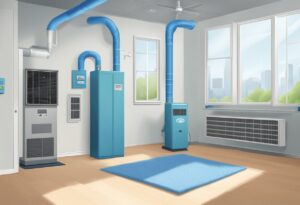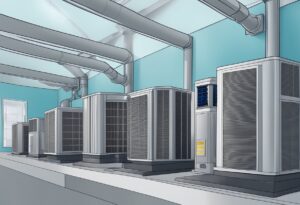A well-maintained HVAC system can do more than just regulate the temperature of your home. It can also help alleviate allergies. HVAC systems play a crucial role in maintaining indoor air quality, which is essential for people with allergies. Poor indoor air quality can exacerbate allergies and cause respiratory problems.

Indoor air pollutants such as dust, pollen, and pet dander can accumulate in your home’s HVAC system. These pollutants can cause allergic reactions and respiratory problems. Regular maintenance of your HVAC system can help remove these pollutants and improve indoor air quality. This can reduce the risk of allergies and respiratory problems, making your home a healthier place to live.
Importance of HVAC Maintenance for Allergy Relief

Maintaining a well-functioning HVAC system is crucial for reducing allergens and improving indoor air quality. By keeping the air ducts, filters, and other components of the HVAC system clean and free of debris, homeowners can alleviate allergy symptoms and improve overall health.
Dirty air ducts can harbor dust, mold, and other allergens that can trigger allergies and respiratory problems. Regular cleaning of air ducts can help remove these allergens and improve indoor air quality. Similarly, replacing air filters regularly can help trap allergens and prevent them from circulating in the air.
In addition to regular cleaning and maintenance, homeowners can also consider installing air purifiers or UV lights in their HVAC systems. These devices can help remove allergens and improve air quality by killing bacteria and other harmful particles.
Overall, maintaining a well-functioning HVAC system is crucial for reducing allergens and improving indoor air quality. By taking steps to keep the system clean and free of debris, homeowners can alleviate allergy symptoms and improve their overall health.
Understanding Allergies and HVAC Systems

Allergies are a common problem for many people, with symptoms ranging from mild to severe. Allergens, such as pollen, dust mites, and pet dander, can trigger allergic reactions in sensitive individuals. These allergens can be found in both outdoor and indoor environments, and can be difficult to avoid.
Types of Allergens in Indoor Air
Indoor air can contain a variety of allergens that can trigger allergic reactions. Some common indoor allergens include:
- Dust mites: These tiny creatures live in dust and can be found in bedding, carpets, and upholstered furniture.
- Pet dander: This is made up of tiny flakes of skin and hair from pets, and can be found in homes with pets.
- Mold: This can grow in damp areas, such as bathrooms and basements.
- Pollen: This can enter the home through open windows and doors.
How HVAC Systems Can Trap Allergens
HVAC systems can help alleviate allergies by trapping allergens and preventing them from circulating in the air. Here are some ways HVAC systems can trap allergens:
- Air filters: HVAC systems use air filters to trap dust, pollen, and other allergens. It is important to regularly change air filters to ensure they are working effectively.
- Humidity control: HVAC systems can help control humidity levels in the home, which can prevent the growth of mold and dust mites.
- Duct cleaning: HVAC systems use ducts to circulate air throughout the home. Over time, these ducts can become clogged with dust and other allergens. Regular duct cleaning can help remove these allergens from the home.
By properly maintaining HVAC systems, homeowners can help reduce the amount of allergens in the home and alleviate allergy symptoms.
Benefits of Regular HVAC Maintenance
Regular maintenance of HVAC systems can provide numerous benefits, including improved air quality and reduced allergens in the air. Here are some of the specific benefits of regular HVAC maintenance:
Improved Air Filtration
One of the primary benefits of regular HVAC maintenance is improved air filtration. Over time, the air filters in HVAC systems can become clogged with dust, dirt, and other debris, reducing their effectiveness at capturing airborne allergens. Regular maintenance, including filter replacement, can help ensure that the air filters are clean and functioning properly, which can lead to improved air quality and reduced allergy symptoms.
Prevention of Mold and Mildew Growth
Mold and mildew can thrive in warm, humid environments, making HVAC systems a potential breeding ground for these allergens. Regular HVAC maintenance can help prevent the growth of mold and mildew by ensuring that the system is clean and free of moisture buildup. This can help reduce the presence of these allergens in the air, which can be especially important for individuals with allergies or respiratory issues.
Enhanced Air Circulation
Proper air circulation is essential for maintaining good air quality and reducing allergens in the air. Regular HVAC maintenance can help ensure that the system is functioning properly and providing adequate air circulation throughout the home or building. This can help reduce the concentration of allergens in the air and improve overall air quality.
In summary, regular HVAC maintenance can provide numerous benefits for individuals with allergies, including improved air filtration, prevention of mold and mildew growth, and enhanced air circulation. By taking steps to keep HVAC systems clean and functioning properly, individuals can help reduce the presence of allergens in the air and alleviate allergy symptoms.
Key Maintenance Tasks for Allergy Management
Filter Replacement
One of the most important tasks for maintaining a healthy HVAC system and alleviating allergies is replacing the air filters regularly. Dirty and clogged filters can cause the system to work harder, which can result in poor air quality and increased allergens in the air. Experts recommend replacing filters every three months, but it may need to be done more frequently if the system is used heavily or if there are pets in the home.
Duct Cleaning
Duct cleaning is another important maintenance task that can help alleviate allergies. Over time, dust, dirt, and other allergens can accumulate in the ducts, which can then be circulated throughout the home. Regular duct cleaning can help remove these allergens and improve the air quality in the home. It is recommended to have the ducts cleaned every three to five years, depending on usage and the level of allergens in the home.
Regular Inspections and Tune-Ups
Regular inspections and tune-ups are crucial to maintaining a healthy HVAC system and reducing allergens in the air. A professional HVAC technician can inspect the system for any issues, such as leaks or damaged parts, and make necessary repairs. They can also perform a tune-up, which includes cleaning and adjusting the system to ensure it is running efficiently. It is recommended to have an inspection and tune-up performed at least once a year, preferably before the start of the heating or cooling season.
By performing these key maintenance tasks, homeowners can help alleviate allergies and improve the air quality in their homes. Regular filter replacement, duct cleaning, and inspections and tune-ups can help ensure a healthy HVAC system that provides clean and comfortable air.
Advanced HVAC Features to Combat Allergies
HEPA Filters
HEPA filters are one of the most effective ways to combat allergens in the air. These filters are designed to capture particles as small as 0.3 microns, including pollen, dust mites, and pet dander. By trapping these allergens, HEPA filters can help alleviate allergy symptoms and improve air quality.
UV Lights
UV lights are another advanced HVAC feature that can help alleviate allergies. These lights are installed in the HVAC system and work by killing bacteria, viruses, and other microorganisms that can trigger allergies. UV lights are particularly effective at combating mold and mildew, which can thrive in damp environments and exacerbate allergy symptoms.
Air Purifiers
Air purifiers are another effective way to combat allergens in the air. These devices work by filtering the air and removing allergens, such as pollen, dust, and pet dander. Some air purifiers also include UV lights or HEPA filters for added effectiveness.
Overall, these advanced HVAC features can be highly effective at alleviating allergy symptoms and improving air quality. By investing in a well-maintained HVAC system with these features, homeowners can create a healthier and more comfortable living environment.
DIY Maintenance Tips for Allergy Reduction
Regular maintenance of HVAC systems can help alleviate allergies. Here are some DIY maintenance tips that can help reduce allergens in the air:
- Clean or replace air filters: Dirty air filters can accumulate dust, pollen, and other allergens, reducing the air quality in your home. It is recommended to clean or replace air filters at least once a month.
- Clean air ducts: Dust, mold, and other allergens can accumulate in air ducts over time. You can clean air ducts by removing the vent covers and using a vacuum cleaner to remove the debris. It is recommended to have air ducts professionally cleaned every few years.
- Clean coils: Dirty coils in the HVAC system can reduce the efficiency of the system and allow allergens to circulate in the air. You can clean the coils by turning off the power to the system and using a soft brush to remove the debris.
- Keep the area around the outdoor unit clean: The outdoor unit of the HVAC system can accumulate debris such as leaves, grass, and pollen. Keeping the area around the unit clean can help reduce allergens in the air.
By following these DIY maintenance tips, you can help reduce allergens in the air and improve the air quality in your home.
Professional Services and Allergy-Focused HVAC Solutions
For individuals who suffer from allergies, having a well-maintained HVAC system is essential. Professional services can provide allergy-focused solutions that help to alleviate symptoms and create a healthier indoor environment.
One such solution is the installation of HEPA filters. HEPA filters are designed to capture microscopic particles such as pollen, dust mites, and pet dander. By removing these allergens from the air, HEPA filters can significantly reduce allergy symptoms.
Another solution is the use of UV lights. UV lights can be installed within the HVAC system to kill mold, bacteria, and viruses. This can help to reduce the number of allergens circulating in the air and improve overall indoor air quality.
Regular maintenance is also important in keeping an HVAC system functioning properly. This includes cleaning and inspecting the system, replacing filters, and ensuring that all components are working correctly. By keeping the system clean and well-maintained, individuals can reduce the number of allergens in their home and improve their quality of life.
Overall, professional services and allergy-focused HVAC solutions can provide significant benefits for individuals who suffer from allergies. By investing in these solutions and maintaining their HVAC system, individuals can create a healthier and more comfortable indoor environment.

0 Comments